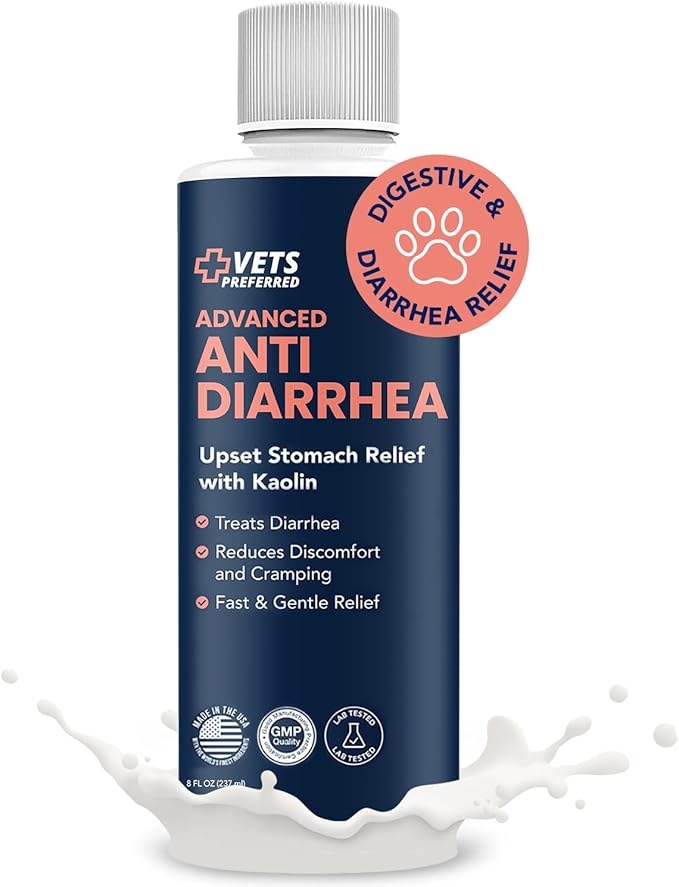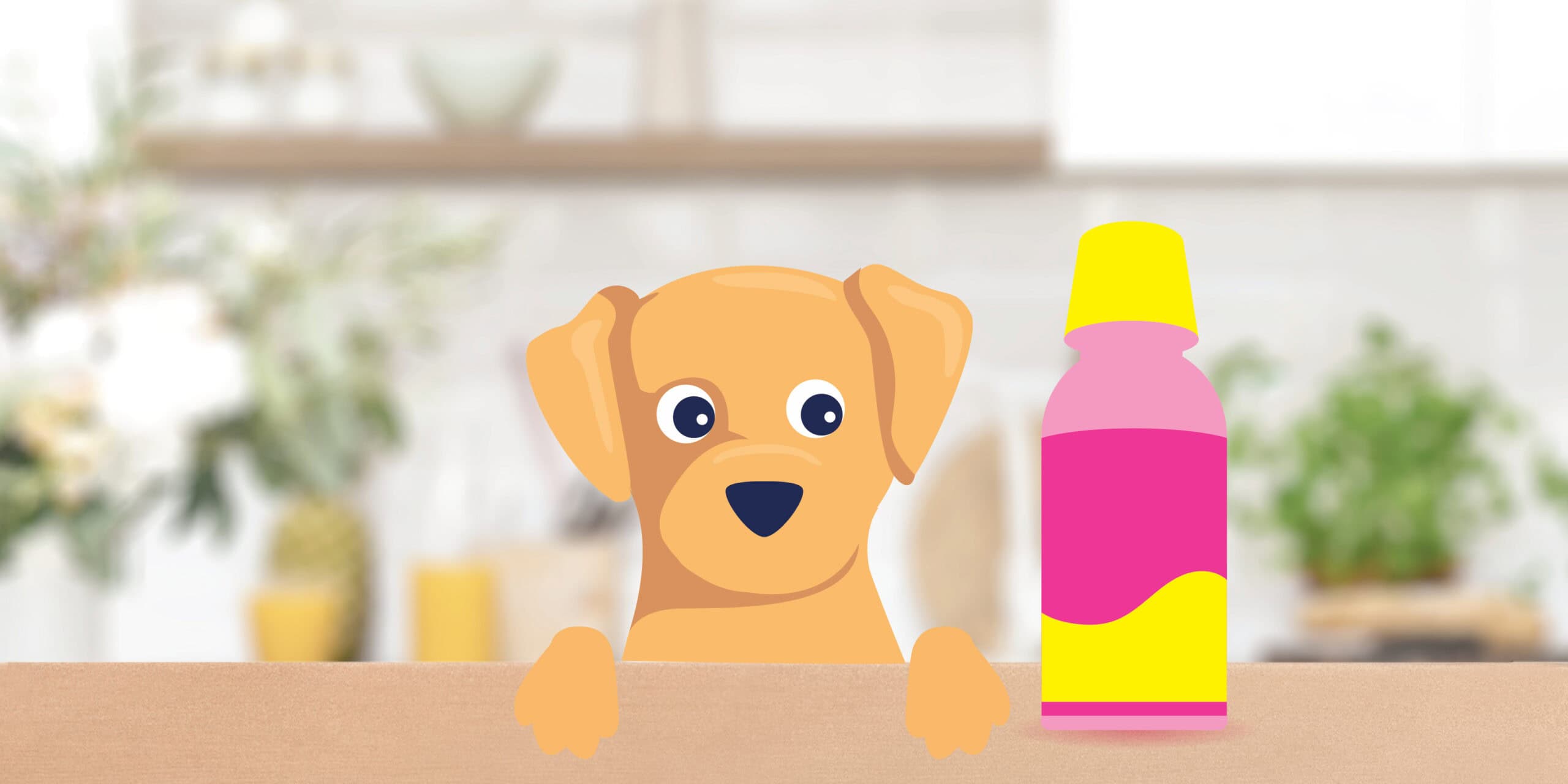If you click on links we provide, we may receive compensation.
Pepto Bismol is a common over-the-counter medication to solve mild stomach aches, diarrhea, or heartburn. As it is such an effective and safe medication for people, it’s natural to wonder if pepto bismol for dogs has the same healing properties in humans.
Let’s explore if it’s safe to use, how it works, side effects, and alternatives you can use in this blog!
Can I Give My Dog Pepto Bismol?
Pepto-Bismol can be given to dogs in moderation under a vet’s guidance. It can alleviate symptoms like nausea, heartburn, and an uncomfortable stomach. However, it’s not for long-term use due to potential side effects like constipation and toxicity. The recommended dosage is 1 teaspoon per 10 pounds of body weight. Always consult a vet before administering any medication.
Pepto Bismol Dosage by Weight (lbs) Chart
Below is a table illustrating how much Pepto Bismol you can give your dog depending on how much it weights:
| Body Weight (in pounds) | Pepto Bismol Dosage (in teaspoons) |
|---|---|
| 10 | 1 |
| 20 | 2 |
| 30 | 3 |
| 40 | 4 |
50 | 5 |
| 60 | 6 |
| 70 | 7 |
| 80 | 8 |
| 90 | 9 |
| 100 | 10 |
| 110 | 11 |
| 120 | 12 |
| 130 | 13 |
| 140 | 14 |
| 150 | 15 |
| 160 | 16 |
| 170 | 17 |
| 180 | 18 |
| 190 | 19 |
| 200 | 20 |
How Does Pepto Bismol Work?
Pepto Bismol has an active ingredient called Bismuth Subsalicylate. Bismuth is a type of metal particle that can bind easily to other molecules in or on the gut, aiding its gastroprotectant qualities. Subsalicylate is part of the aspirin family and is thought to have anti-inflammatory properties.
Uses of Pepto Bismol for Dogs
Pepto Bismol for dogs has been trialed for several different conditions. Its primary use is as a gastroprotectant. Pepto Bismol is a liquid that sticks to the surface of the intestines and protects it from the absorption of toxins or bacteria that may cause harm during episodes of diarrhea.
Coating the stomach and intestines, it creates an environment that promotes healing and has been used in treating stomach ulcers in dogs. Pepto Bismol is thought to have anti-inflammatory properties in people, so it may have the same properties in dogs, although this remains unproven.
Side Effects of Pepto Bismol in Dogs
Before considering the use of Pepto Bismol for your furry companion, it’s essential to be aware of its possible side effects on dogs.
- Constipation: Large doses or prolonged use of Pepto Bismol can lead to constipation in dogs.
- Toxicity: Giving dogs excessive amounts of Pepto Bismol or administering it repeatedly can be toxic to them. Signs of toxicity may include vomiting, diarrhea, neurological symptoms, and potential kidney or liver damage.
- Stool color changes: Pepto Bismol contains bismuth, which can darken the color of the stool. This can be concerning, as it may resemble a black stool (melena) associated with internal bleeding in the upper gastrointestinal tract.
It’s crucial to use Pepto Bismol in dogs under the guidance of a veterinarian to ensure proper dosage and minimize the risk of side effects.
Alternatives to Pepto Bismol for Dogs
The main reason we think of using Pepto Bismol for dogs is to try and alleviate vomiting or diarrhea at home. The good news is that most episodes of vomiting, diarrhea, or both are self-limiting and usually respond well to supportive at-home care.
- Supportive Care: Most cases of vomiting and diarrhea in dogs are self-limiting and can be managed at home. Provide rest, limit physical activity, offer fresh water, and explain to children the need for the dog’s space. Avoid scolding the dog for accidents indoors.
- Bland Diet: Feed small portions of easily digestible foods like boiled chicken, boiled rice, pumpkin, or cottage cheese to settle the stomach. If the dog can tolerate this diet without vomiting for 24 hours, gradually reintroduce their regular food.
- Know When to Seek Veterinary Attention: If the dog vomits blood or foreign material, immediate veterinary attention is necessary.
- Vet-Prescribed Medications: If a veterinary examination is required, the vet may prescribe medications specifically designed for dogs, including anti-nausea tablets, gastro protectants, and anti-diarrheal suspensions. These medications have been scientifically proven to be safe and effective for dogs.
For a fast-acting, over-the-counter solution, you can also consider using products like Anti Diarrhea Liquid for Dogs – a trusted option to help manage your dog’s upset stomach and relieve diarrhea while you wait for veterinary care.

Conclusion
In conclusion, Pepto Bismol can be used in dogs under the guidance of a veterinarian for specific medical issues. It can help alleviate symptoms like nausea and an uncomfortable stomach. However, it’s essential to use it cautiously and avoid long-term use due to potential side effects such as constipation and toxicity. Always consult a veterinarian before giving any medication to your dog.
If your dog experiences persistent issues or if you’re unsure about the appropriate treatment, it’s best to book a check-up with a veterinarian. They can thoroughly examine and recommend the most suitable action for your furry companion’s health and well-being.
Talk online with a veterinarian from BetterVet if you have additional questions.
Frequently Asked Questions
Is pepto bismol safe for dogs?
Pepto Bismol is safe for dogs if used under a vet’s direction for a specific medical issue, but long-term use should be avoided due to potential side effects.
How much pepto bismol can I give my dog?
The recommended dosage of Pepto Bismol for dogs is 1 teaspoon per 10 pounds of body weight. However, it should only be given under the direction of a veterinarian for a specific medical issue and not used long-term due to side effects.
Can I give pepto bismol to my pregnant or nursing female?
Pepto Bismol is not advised for use in pregnant or lactating bitches, or dogs with known clotting or bleeding disorders.
Can I give my dog pepto bismol for diarrhea?
Pepto Bismol should not be used for diarrhea in dogs. It’s essential to consult a vet for proper diagnosis and treatment recommendations.
Can dogs have pepto bismol for vomiting?
Pepto Bismol can be given to dogs for vomiting, but it’s crucial to seek veterinary advice to determine the underlying cause and appropriate treatment.
Can a dog have pepto-bismol for an upset stomach?
Pepto Bismol may be used for an upset stomach in dogs, but it’s recommended to consult a veterinarian for a proper evaluation and guidance.
Can pepto bismol kill a dog?
Large volumes or repeated administration of Pepto Bismol can be toxic to dogs. If accidental ingestion occurs, contact a vet immediately.





